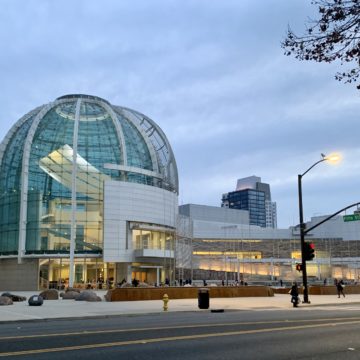Nearly a year after it first convened, the 23-member body in charge of making changes to San Jose’s city charter is finished with its duty.
Wednesday’s meeting of the Charter Review Commission unanimously rubber-stamped final recommendations for numerous changes to city laws—including shifting the timing of mayoral elections and adding more council districts. Commissioners voted 16-0, with several absent since the meeting carried over from Monday. Several commissioners previously said they couldn’t make the second meeting.
The City Council will review the recommendations on Dec. 14. Any changes to the city’s charter must ultimately be decided by voters.
“Our service to the city in this process has been completed,” said Commission Chair Fred Ferrer after the vote. “Thank you all for your efforts, your work, your diligence, your intelligence and your kindness in making sure we were serious about this process.”
The City Council formed the 23-member commission in September 2020 after a split council grappled with Mayor Sam Liccardo’s “strong mayor” initiative to give his office more executive power.
“I’m happy we got it all done,” Commissioner Maria Fuentes told San José Spotlight. “If the council were to take all our charter recommendations and put them before the voters, that will make the last 11 months, with all the hard work from 23 individuals, more than worth it.”
Here are some of the major recommendations commissioners made.
Mayoral powers
In one of its most important decisions, the commission declined recommending changing the city’s existing “mayor-council” system, which gives executive power to a city manager, to a “strong-mayor” system, which gives the mayor more power. A strong-mayor system gives the mayor the power to hire and fire department heads at will, without the consent of a city manager. The commission believes a strong mayor will not improve accountability or inclusion in the city.
The commission also recommends allowing the City Council to nominate a city manager—instead of just the mayor.
Moving mayoral elections
In an effort to boost voter turnout, especially among low-income and minority voters, commissioners recommend the city move its mayoral contests from midterm election years to presidential election years starting in 2024. Should the council and voters agree to the change, the city will have mayoral elections in 2024 and 2026, with an election every four years after 2026.
Four new districts
The commission is recommending expanding the City Council from 10 districts to 14. With the change, the commission hopes to put the councilmember-to-resident ratio closer to what it was in the 1970s.
Ten districts anchor the city since its expansion from seven districts in 1978. San Jose’s population, according to the city, was approximately 600,000 at the time, meaning councilmembers represented 60,000 people each.
According to numbers from the 2020 census, the city has ballooned to more than 1,000,000 residents, and each district now represents approximately 100,000.
Commissioners hope an increased amount of districts will better represent the city’s diverse population.
Ranked-choice voting
Commissioners want city elections to switch to ranked-choice voting, which allows residents to select their first, second and third choices for elected officials. If a resident’s first choice is eliminated from the race, their vote shifts to the second choice. The process continues until a single candidate garners a majority of votes.
Four cities in the Bay Area—San Francisco, Oakland, Berkeley and San Leandro—already use ranked-choice voting to elect councilmembers. Earlier this year, New York City chose its next mayor using the ranked-choice voting system.
Exploring nonprofit-owned housing
Commissioners want the council to continue exploring the Community Opportunity to Purchase Act (COPA). COPA allows qualified nonprofits first right to purchase certain properties on the market to prevent displacement. If another buyer makes an offer, nonprofits under COPA will have the right to match it.
The state’s eviction ban ended in September, leaving thousands of residents unsure about where they will stay. Housing advocates have lobbied for COPA initiatives across the state in hopes of establishing housing developments that aren’t at the mercy of landlords.
New commissions
Commissioners want the city to establish police and climate action commissions. Commissioners recommend the City Council take up actions related to the climate commission to bypass a vote by residents to speed up the process on a “dire” issue.





